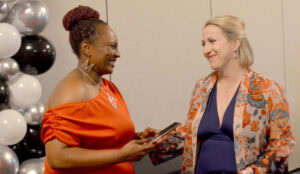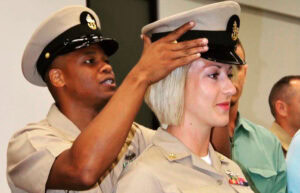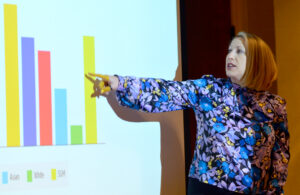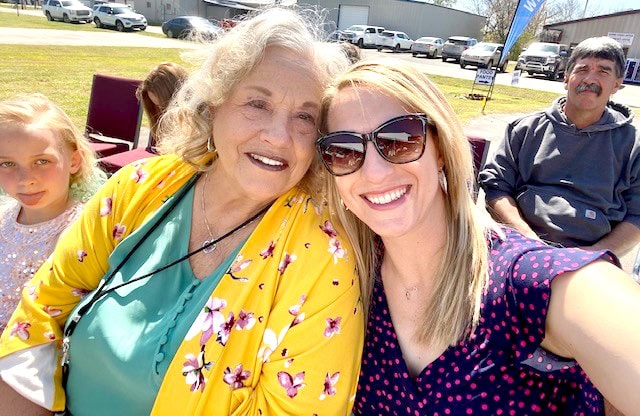Allen Uses Rural Faulkner County Roots to Remain Focused on Her Goals
| Jaimi Allen, Ph.D., is grateful to be an educator and researcher who specializes in addressing Arkansas’ health disparities.
“When I consider where I currently am, I’m extremely humbled,” she said. “I want to make the most of my opportunities and help as many people as I can.”
When asked about her passion to solve health disparities — Allen quickly referenced rural Arkansas.
“I’m a country girl from Mount Vernon who’s blessed with a loud voice and a persistent personality,” Allen said. “I can be the voice for people who don’t have a voice. Since I’m blessed with the voice and the personality I have, it’s my duty to use it to make a positive impact.
“Being outspoken comes naturally for me. Being loud, outspoken is who I am.”
Allen, a research faculty member in the University of Arkansas for Medical Sciences (UAMS) Fay W. Boozman College of Public Health Department of Epidemiology, is emphatic about serving others because she comes from a situation that had its challenges.

Jaimi Allen, Ph.D., (right) smiles while being presented an award by a member of the Arkansas Cancer Coalition.
Allen was raised, alongside her three siblings, by their mother in Mount Vernon — a town of nearly 200 residents in Faulkner County. Allen has fond memories of her hometown.
“Going to the “big city” was going to Conway, and we didn’t really do that unless we had to,” she said. “Mount Vernon is a wonderful place. There are no stop lights. Maybe a few stop signs and plenty of dirt roads. We have only one store: a feed/convenience store, which was opened just a few years ago. Everyone knows each other. People know your business, whether it’s true or not,” as she smiled.
As for what people knew of Allen, individuals viewed her as a leader of her peers, especially regarding Mount Vernon High School activities. Allen was a three-time All-State selection in both softball and basketball in addition to being president of her class and the Spanish club and active in the Beta Club. She graduated in 2003 as valedictorian with a 4.2 grade point average.
“I had to stay engaged,” she said. “I wanted to be a part of what’s going on at school.”
After graduation, she attended the University of Central Arkansas (UCA). During that period, Allen’s mettle often was tested.
“I keep in mind that I shouldn’t be where I am today,” she said. “There were many times when I thought about how it would be easier to quit and take a different career path. But I had my Momma, my family encouraging me to keep me going.”
UNDERGRADUATE YEARS
Allen received a scholarship and Pell Grant to help pay for her education. Also, she received financial support from her mom. But the caveat was she had to remain in school and flourish.
“I just made friends with certain classmates and focused on education,” she said.
For Allen figuring out what she wanted to do regarding a career proved difficult. It took her six years to earn a bachelor’s in health education due to switching from her initial major.
In fact, the weeks leading to graduation were uneasy as she had not yet figured out what was next. Eventually, a few days before graduation, Allen join the United States Navy.
“Walking across the stage should’ve been a moment of pride,” Allen said. “Instead, it was almost a moment of panic because I realized that I had to go into the real world at that point.
“I had no idea what I was going to do with the degree I just obtained.”
Allen — the first female in her family to join the military — recalls not having much time to relax following graduation.
“I graduated from UCA, and I celebrated with my family that day,” she said. “The following night I left for basic training in Great Lakes, Illinois.”
THE MILITARY
Currently, in addition to being a faculty member for the UAMS College of Public Health, Allen is in the Navy Reserve. She’s been in the Navy for nearly 15 years and is a senior chief petty officer in the Information Warfare Community.
“Being in the military helps me understand what really matters,” Allen said. “Joining the Navy was one of the best decisions I’ve ever made.”

Jaimi Allen, Ph.D., faculty in the UAMS Fay W. Boozman College of Public Health, is shown officially rising to the next rank of the United States Navy.
Allen appreciates the amazing opportunities she received due to being in the military. However, there was a time when she questioned her decision to join.
Due to being 25 years old when enlisting, Allen received a supervisory role. That was tough on her — especially in the early stages of basic training.
“We get off the bus … and they’re in my face yelling,” she emphatically said. “I didn’t know what I had signed up for.
“Honestly, I tried to leave the first day. I wasn’t prepared for the experience in the slightest, and thought I made a horrible mistake. However, I eventually changed how I approached the situation, and after a couple weeks of basic training, I realized I’d be fine.”
Recognizing that most of her peers were younger, fresh out of high school, and impressionable also factored in her renewed outlook.
“I understood that I had to get myself together to be a good leader,” she said.
Once Allen adapted, it was smooth sailing, and she finished training as a section leader in the division. Through her ties with the Navy, she has spent time in at least 16 different states and four foreign countries. In the process, she’s developed an acceptance and empathy for many cultures unlike her own. Allen has also gained an appreciation for how the United States provides an opportunity for people to pursue their dreams.
Regarding dreams and aspirations, Allen got an urge to get a master’s degree, so she went into the reserve force and returned to school.
BACK TO SCHOOL
As an undergraduate student at UCA, Allen struggled to figure out what profession she wanted to enter. But after developing a military mindset, that was not the case this time around. Allen, who was pursuing a master’s in health sciences, became focused on a career in public health.
“I took school seriously,” she said. “I pursued a degree I could get a career in compared to just doing something that I thought others wanted me to do. I wanted to have job options as soon as I graduated. I earned a 4.0 GPA in grad school because I took my educational experience seriously.”
“As a nontraditional student, I wanted to help other people learn and grow, too. I was hungry to learn.”
Due to her success in the classroom, Allen would almost immediately accept an invitation to be a UCA graduate assistant, starting her career as an educator. Through being a teacher and seeing what goes on behind the scenes, Allen realized that the power brokers in education had a doctorate. That’s when she decided to pursue a doctoral degree.
Allen attended Texas Woman’s University, enrolling in its hybrid doctorate program where she’d only had to go on-site in Denton mostly on the weekends. The program allowed her to teach full time while also being able to attend the monthly Navy drill sessions.
Allen completed the program and defended her dissertation in five years. During the times of fatigue, thoughts of and words of encouragement from her family — most notably her mom and papa — kept her going.
TAKING THE NEXT STEP
After completing the doctoral program, Allen remained in her role as a health educator at UCA and health coach. Soon, an unforeseen development would inspire her to move on.
“At the beginning of COVID, I did a priority check and realized it was time to explore other career options,” she said.
Allen’s decision was linked to her grandmother, who died due to cancer, and her dad, who was dealing with cancer at the time. Therefore, she sought postdoctoral opportunities that focused on researching cancer outcomes, which led her to apply for the UAMS postdoc program. Eventually, she’d join the faculty in the UAMS Department of Epidemiology.

Jaimi Allen, Ph.D., volunteers at the 2024 Arkansas Cancer Coalition Conference where she led a discussion on health equity.
“My goal is to reduce cancer health disparities in Arkansas and beyond,” she said. “I hope to make a huge impact in the lives of many people.
“From the standpoint of being a faculty member and educator, I’m training the next generation of health professionals and leaders. Our students are the ones who’ll continue carrying the torch to make policy changes and programs to address health inequities.”
Allen has that perspective because she’s seen first-hand how health disparities undermine the well-being of entire communities — a situation hits close to home for her as a native of rural Arkansas. Allen said she uses that rural foundation to assist her when conducting community research.
“When I’m working to help a small town with health disparities, it helps when the people know that I too am from a small town,” she said. “It helps me when I’m able to just talk and let people hear my country drawl,” she said with a smile.
As an educator and member of the military, Allen has had life-changing encounters that inspire her daily. But nothing motivates Allen more than thoughts of her family and community members of Mount Vernon.
“In all reality, I probably shouldn’t be where I’m at in life,” Allen said. “I think about my upbringing and how my mom would work multiple jobs and sometimes even wear clothes with holes in them just so my siblings and I could go to school and feel cool wearing nice clothes. I often think back on my mother’s sacrifices.
“I’m grateful for my country girl background. It opens doors for me. It helps me connect to the community and make a difference, especially in the cancer community.”
